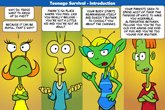Building 'cellular bridges' for spinal cord repair after injury
Capitalizing on the flexibility of tiny cells inside the body's smallest blood vessels may be a powerful spinal cord repair strategy, new research suggests.
Categories: Teen Health
IV medication could be taken orally for range of cancer, Alzheimer's treatments
Breakthrough research could make any IV drug able to be taken orally for a range of hard-to-treat cancers and other diseases, and redefine how medicines are designed, evaluated and delivered.
Categories: Teen Health
Early-life exposure to air and light pollution linked to increased risk of pediatric thyroid cancer
A new study suggests that early-life exposure to two widespread environmental pollutants -- small particle air pollution and outdoor artificial light at night -- could increase the risk of pediatric thyroid cancer. The study found a 'significant association' between exposure to ambient fine particulate matter air pollution (PM2.5) and outdoor artificial light at night (O-ALAN) and increased risk of papillary thyroid cancer in children and young adults up to 19 years old. The exposures occurred during the perinatal stage of life, typically defined as the time from when pregnancy occurs up to a year after birth.
Categories: Teen Health
Cognitively impaired older drivers are less likely to cause a crash when accompanied by a passenger
Researchers examined variations in the likelihood of older drivers causing traffic crashes based on the presence of a passenger, utilizing nationwide traffic crash data between 2014 and 2020. Their analysis revealed that even drivers with cognitive impairment had a reduced risk of causing crashes when accompanied by a passenger.
Categories: Teen Health
Nontraditional risk factors shed light on unexplained strokes in adults younger than 50
Among adults ages 18-49 (median age of 41 years) who were born with a hole in the upper chambers of their heart known as patent foramen ovale (PFO), strokes of unknown cause were more strongly associated with nontraditional risk factors, such as migraines, liver disease or cancer, rather than more typical factors such as high blood pressure.
Categories: Teen Health
Your Everyday Choices Matter This Earth Day
Earth Day is April 22, and it’s your chance to make a real impact. Simple actions—like using a reusable water bottle, unplugging electronics when not in use, or saying no to plastic bags—can collectively lead to significant environmental benefits.
You‘re not alone in caring about the planet. A recent survey by the National 4-H Council found that 84 percent of teens believe addressing climate change now is crucial for future generations. By adopting sustainable habits like walking or biking instead of driving, recycling properly, and reducing fast-fashion consumption, you can be part of the solution. Remember, every small step you take contributes to a healthier Earth.
You‘re not alone in caring about the planet. A recent survey by the National 4-H Council found that 84 percent of teens believe addressing climate change now is crucial for future generations. By adopting sustainable habits like walking or biking instead of driving, recycling properly, and reducing fast-fashion consumption, you can be part of the solution. Remember, every small step you take contributes to a healthier Earth.
Categories: Teen Health
Primate mothers display different bereavement response to humans
Macaque mothers experience a short period of physical restlessness after the death of an infant, but do not show typical human signs of grief, such as lethargy and appetite loss, finds a new study by anthropologists.
Categories: Teen Health
Gestational diabetes linked to ADHD in children
A new study has found children born to mothers who experienced gestational diabetes (GDM) during pregnancy are more likely to develop attention-deficient hyperactive disorder (ADHD) and externalizing behavior.
Categories: Teen Health
Sleep matters: Duration, timing, quality and more may affect cardiovascular disease risk
Healthy sleep includes multiple components, such as number of hours of sleep per night, how long it takes to fall asleep, daytime functioning and self-reported sleep satisfaction, and addressing these different dimensions of sleep may help to reduce cardiometabolic health and related risk factors, according to a new scientific statement.
Categories: Teen Health
Why Money Matters More Than Ever
If you‘ve been hearing a lot about rising prices, tariffs, or the economy being “uncertain,” you‘re not alone—and even though it might sound like adult stuff, it affects you, too. From the cost of snacks and clothes to saving up for a car or college, money just doesn’t stretch as far as it used to.
That’s why now is a great time to start learning how to budget and manage your money. Knowing how to track your spending, save for goals, and make smart choices can help you feel more in control, even when the economy is unpredictable. These are real-life skills that can make a big difference—starting now and way into your future.
That’s why now is a great time to start learning how to budget and manage your money. Knowing how to track your spending, save for goals, and make smart choices can help you feel more in control, even when the economy is unpredictable. These are real-life skills that can make a big difference—starting now and way into your future.
Categories: Teen Health
Running on empty: Poor nutrition increases injury risk for female athletes
Proper nutrition is crucial for enhancing athletic performance, supporting recovery and overall health. Now, a new study reveals that proper nutrition is also key to reducing risk of injury, especially for females.
Categories: Teen Health
Unsafe driving during school drop offs at 'unacceptable' levels
Risky driving by parents and other motorists who do the school run is putting children in danger, according to a new study.
Categories: Teen Health
Hidden potential in multiple disabilities
Using eye-tracking -- a technique for recording and analyzing eye movements -- a team has shown that individuals with multiple disabilities can improve their social and emotional skills. Although these patients are often considered 'untestable', nine young people have undergone personalized training over a period of one year, with promising results in terms of their ability to socialize. This work opens the way to new methods of assessment and support.
Categories: Teen Health
Eight or more drinks per week linked to signs of injury in the brain
Heavy drinkers who have eight or more alcoholic drinks per week have an increased risk of brain lesions called hyaline arteriolosclerosis, signs of brain injury that are associated with memory and thinking problems, according to a new study.
Categories: Teen Health
Protein necessary for fruit fly fertility
Researchers have found a new role for the transcription factor (proteins that regulate the transcription, or copying, of genes). In the fruit fly, this transcription factor, named Traffic Jam, activates a non-coding piRNA gene named Flamenco to promote female fruit fly (drosophila) fertility. The discovery solves the 30-year-old mystery of how Flamenco gets activated to protect fruit fly ovaries from a series of genetic parasites called retroviral transposons, and may one day help with infertility issues in humans.
Categories: Teen Health
Early education impacts teenage behavior
Researchers explored the long-term effects of preschool expansion in Japan in the 1960s, revealing significant reductions in risky behaviors amongst teenagers. By analyzing regional differences in the rollout of the program, the study identified links between early childhood education and lower rates of juvenile violent arrests and teenage pregnancy. The findings suggest that improved noncognitive skills played a key role in mitigating risky behaviors, highlighting the lasting benefits of early-education policies.
Categories: Teen Health
Childhood experiences shape the brain's white matter with cognitive effects seen years later
Investigators have linked difficult early life experiences with reduced quality and quantity of the white matter communication highways throughout the adolescent brain. This reduced connectivity is also associated with lower performance on cognitive tasks.
Categories: Teen Health
Decision Time: Seniors Face Big Choices
For high school seniors, April is when things start to get real. This is the month when many students are making final decisions about their next steps—whether that’s committing to a college, enrolling in a trade school, joining the workforce, or considering the military. It’s a big moment, and it’s important to think through your options carefully.
Whatever path you choose, make sure it aligns with your goals and interests. There’s no one “right”; choice. College isn’t the only option; trade careers are in demand, the job market is full of possibilities, and the military can offer strong benefits and structure. Take the time to explore, ask questions, and choose the direction that feels like the best fit for your future with these tips.
Whatever path you choose, make sure it aligns with your goals and interests. There’s no one “right”; choice. College isn’t the only option; trade careers are in demand, the job market is full of possibilities, and the military can offer strong benefits and structure. Take the time to explore, ask questions, and choose the direction that feels like the best fit for your future with these tips.
Categories: Teen Health
Teens Under Pressure: What You’re Feeling Is More Common Than You Think
If you’ve been feeling stressed about school, friendships, or just life in general—you’re definitely not alone. A new survey from Pew Research Center shows that both teen guys and girls are under a lot of pressure, especially to get good grades and figure out their future.
Girls often feel pressure to fit in and look a certain way, while guys feel like they’re expected to be tough or great at sports. But underneath it all, most of you care about your future, want real friends, and deal with mental health stuff—even if it shows up in different ways. However you’re feeling, it matters, and you deserve support that actually fits you.
Girls often feel pressure to fit in and look a certain way, while guys feel like they’re expected to be tough or great at sports. But underneath it all, most of you care about your future, want real friends, and deal with mental health stuff—even if it shows up in different ways. However you’re feeling, it matters, and you deserve support that actually fits you.
Categories: Teen Health
Biological pathway in the brain could help explain why teenage girls are more depressed than boys
Research has shown that a biological brain mechanism called the 'kynurenine pathway' is imbalanced in adolescents with depression, and this imbalance is more pronounced in teenage girls than boys.
Categories: Teen Health






